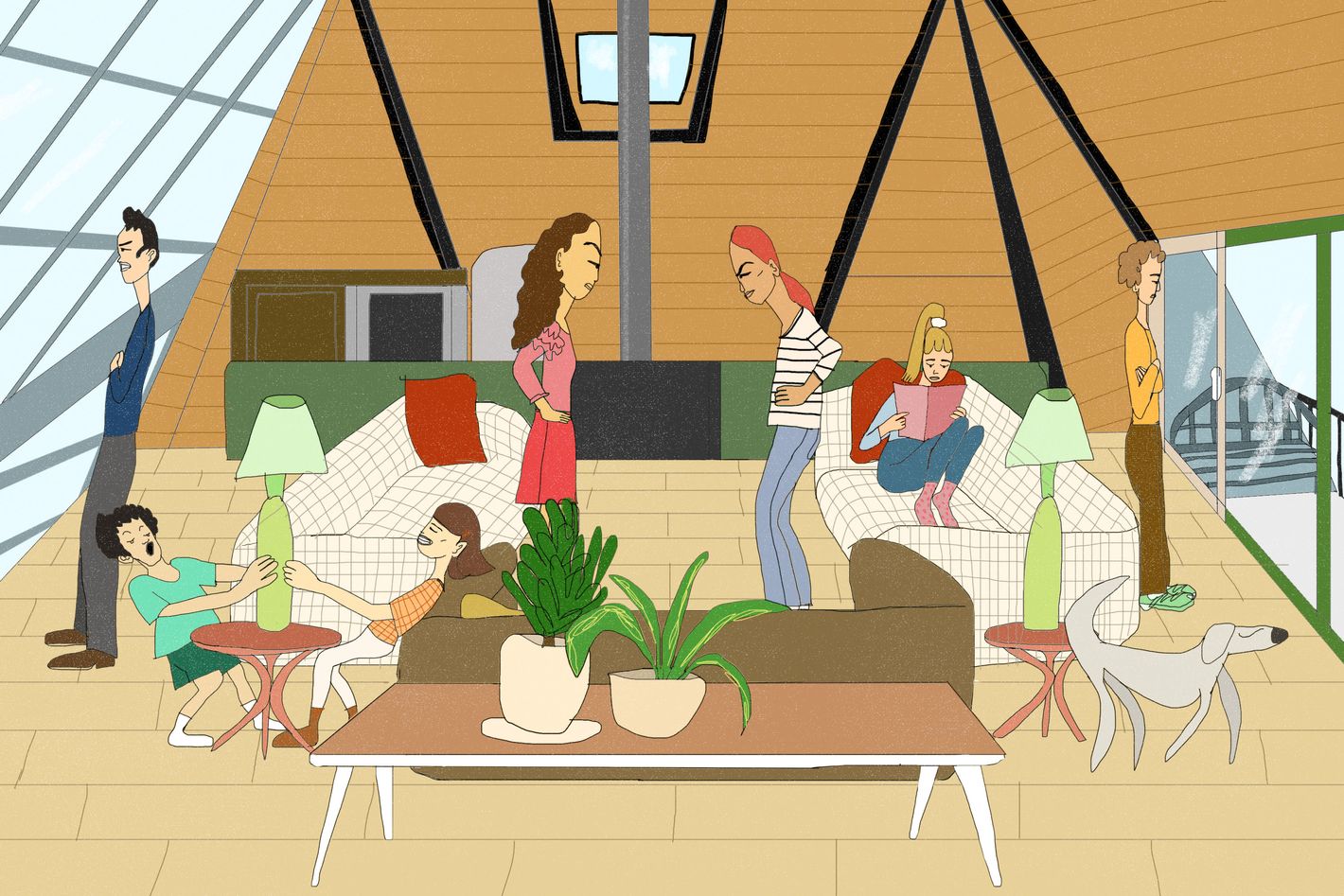
This article originally appeared in Brooding, a subscriber-exclusive newsletter about modern family life. Sign up here.
Family life has a front stage and a backstage. The way we behave together in public is so different as to sometimes be unrecognizable from the way we behave together in the privacy of our homes. When the sociologist Erving Goffman proposed his theory of dramaturgy in everyday life, he was describing these many selves: our work self, our home self, our out-with-the-girls self; the self that sits in a paper dress waiting for the doctor to see us. Each context imposes a slightly different set of behavioral rules.
Families have different selves too. The dramaturgical demands vary with the ages of your kids. When you’re chasing a toddler, it’s to be expected that you’d talk to them in public much the way you’d talk to them at home. This changes when your kid gets to middle school and acquires very strong feelings about the tone of voice you use with them within earshot of other people.
But concealed in their homes, most families are, above all, small groups of people behaving rudely together. There are naked families, families who aggressively fart on each other (is this most families? Just wondering), families who use a lot of profanity, families who pee with the door open, and families who have ESPN playing on mute in the living room 24/7. The months unspool happily this way: We conduct ourselves with the utmost respectability at school and work, and in the evening, safe from the judging eyes of our friends and colleagues, it’s a whole different show.
But then spring comes, and it’s time to plan summer break. Let’s actually take a vacation this year! The websites are consulted, and the truth is obvious: All the appealing places on Airbnb are too big for your family to afford alone. What about getting a group together? Renting a big place and then all the kids can play? “We can take turns cooking!” your partner ventures. “Yeah — and we can bring the waffle iron and do a waffle bar for breakfast!”
A fantasy is locking into focus: You’re reading a book in a hammock, and peals of laughter drift across the generous lawn as the kids play tag. Later, the kids are toweled off from an epic beach day and are piled in front of the TV watching an easily agreed-upon film — maybe something actually good like Bend It Like Beckham, they’ll love that! — while the adults sip sundowners out on the porch. And after dinner, everyone will dance in the kitchen like that scene from The Big Chill. Inside jokes will be born. Unexpected alliances will form across the couples. The building blocks of a happy middle age — all set in place at a coastal Airbnb that costs $475/night.
There’s just one problem: While vacationing with another family, you will spend every waking hour being perceived by each other. On vacation we expect to be able to drop the front stage and let the backstage breathe. Is this other family ready for their backstage pass? Are you ready for yours?
Of course, none of this applies if you’re rich. The wealthy can buy privacy, whether that means renting an eight-bathroom behemoth with separate wings and a finished basement, with which to mute the sounds of the children, or having the budget to eat at restaurants every night rather than cook to the taste of each individual picky kid. But for most of us, vacationing in groups is an economic decision as much as a social one.
A veteran of many multifamily vacations told me that she’s learned to bring rigorous self-awareness to her planning. “You have to be really honest with yourself about how much you like the other kids. Other people’s kids can be really annoying, I hate to say it. And the vacation is not going to make you less annoyed.” Likewise, try to identify the ways that your family can be annoying, too. Does bedtime take two hours? Do you tend to fall asleep with your kids at 8, thereby cutting short whatever adult hang might have taken place after-hours? Do your kids have extremely particular eating habits? None of these circumstances are necessarily a problem, but your friends deserve to know what to expect beforehand. Insisting that “Oh, they eat everything!” when they absolutely do not does no one any favors. Inside the Airbnb, your most cherished delusions will come apart at the seams.
For many of us, vacationing with friends is the only time we expose our families’ inner workings. This is so daunting that many families opt never to do it, but the rewards can be epic. To be fully seen, in all your dysfunction, and to stay friends afterward? We all dream of being given grace like that.
One of this veteran group vacationer’s worst weeks was spent with another family in a tiny, paper-walled lakefront cottage while it poured nonstop. There was no place to escape. After that week, she’ll never rent a place she knows is slightly too small, because you can’t control the weather.
Another parent I spoke to described the first trip she took with another family to an island not far from their home. “My daughter cried for like an hour before her nap because the room she was sleeping in was really bright, and she couldn’t get to sleep. And I remember panicking and looking up the ferry schedule to see if we could just, like, leave and never come back. But it was fine. And the other family didn’t care.” Now they vacation together every year.
Vacationing with small kids can feel like all the same domestic work in a less-convenient environment and no decent kitchen implements, and anything you can do on a trip with another family to alleviate that feeling will lift you all up. One parent I spoke to recommended trading date nights, so each couple gets to leave campus alone at least once. (Getting groceries doesn’t count as a date.) “Split up sometimes,” she said. “If families are on different schedules, break it up!”
Assigned meals have a lot of potential for surprise and delight, but communication is essential. No one should feel ashamed of bringing a massive box of frozen chicken strips for the kids and making a whole different meal for the adults. As I have said before, summer is the season for treats.
One mom described a dream scenario: She and her family had taken a day trip away from the group and were making their way slowly home at the end of the day, stopping to look at the sunset on the way. She got a text from her friends who had stayed back at the rental, letting her know that dinner was waiting for them but not to rush home. “What an amazing feeling,” she recalls.
No matter how much you plan, until you become accustomed to traveling with another family, you will always surprise each other, and maybe that’s part of what makes this kind of vacation rewarding. “It’s a messier kind of intimacy,” one mom told me. “It’s about getting over that self consciousness you have when your children don’t perform.”
The group-family vacation wasn’t always so high stakes, I’m sure of that. (“Times have changed,” as you may have heard.) When I was a kid, we’d go stay with my mom’s friend Ann and her husband, D’Arcy, in their tiny cabin on Lake Champlain, which D’Arcy referred to as “Camp Dipshit” when there were a bunch of kids there. I was definitely the most annoying kid of the bunch, but there were probably enough of us that my anxious little remarks were muffled. I doubt any parent was paying enough sustained attention to be embarrassed by any of us or to feel like a bad parent. I have nothing but good memories of Camp Dipshit.
But even today, with our heightened vigilance and careful record-keeping of everyone’s virtues and vices, you might say that sharing a vacation rental with another family is a microdose of communal living. Looseness has a way of creeping in! In this sense, this kind of vacation could be a way to push back against the atomization of our family lives during the rest of the year. Recently New Yorker columnist Jay Caspian Kang wrote about how, in the spirit of communalism, parents can participate in collective decision-making in all sorts of small local contexts, which might chip away at some of the infamous isolation and hopelessness of North American parenting. I like his vision of “little communes everywhere,” and I think our vacations can give us a taste of that collectivist attitude, no strings attached.
More From This Newsletter
- How Do French Parents Raise Their Teenagers?
- Mother Is a Verb
- What Motherhood Looks Like in ‘Florida!!!’
Kathryn Jezer-Morton , 2024-06-08 13:00:35
Source link


